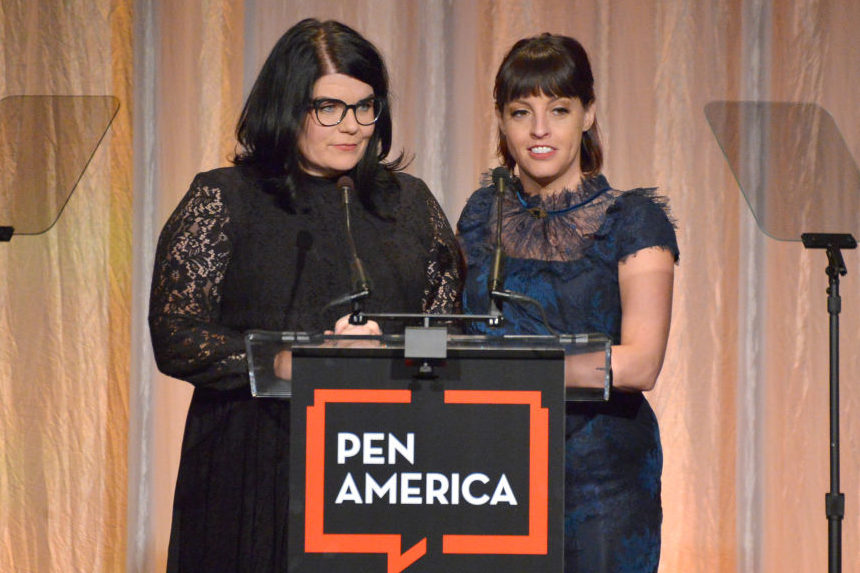This article is in
The Spectator’s November 2019 US edition. Subscribe here.
Everyone loves a good murder. Tales of cold-blooded killing were bringing in audiences even before Truman Capote elevated the telling. Now, as if tales of real-life slaughter aren’t enough, podcasters color the horrors and hook the listeners with spooky music, awkward cliffhangers and a dubious sociological moral.
The typical true-crime podcast has hosts who seem to be chugging wine from the box and narratives ruined by contrived social implications. A cynic or a detective would link this style to the appearance of listicles of the best true-crime podcasts in Good Housekeeping, Oprah Magazine, Town and Country and Women’s Health. Once true crime has you by the listicles, you’re compelled to return to the scene of the pod.
The best true-crime podcast, A Very Fatal Murder, is a mockery of the genre by the satirists at the Onion. Onion Public Radio committed A Very Fatal Murder to the digital airwaves in 2018, the year that true-crime pods took off. The Onion masterfully exposes the schadenfreude behind our fascination with true crime, and how podcasters hypocritically mask that pitch by trying to draw deep-thinking cultural implications from the gore.
‘What makes a murder perfect?’ the first episode begins. ‘What elevates a murder from a regular, ho-hum killing to a crime so gruesome and compelling that it deserves its own podcast?’
Onion Public Radio’s perfect murder must ‘comment on the past and future of intersectional feminism’, so our sleuth-satirist David Pascall uses his OPR-funded Extremely Timely Homicide Locator, or ETHL, to select female victims only. The perfect murder also takes place in a safely picket- fenced neighborhood in Middle America, its citizens so non-coastal that they’ve never been interviewed for a podcast before. That’s how Pascall found the killing of Hayley Price in Bluff Springs, Nebraska.
Pascall mimics podcasters perfectly: the self-satisfied and didactic drawl, the smug and earnest hope to educate whomever they point their mic at. The vocal fry is college-level, and education is the pretend goal of the chilling stories they’re peddling. A gesture towards a pop-sociological lesson is obligatory, with psychological narratives the lowest-hanging fruit.
The non-satirical 12-part Happy Face podcast relates the serial murders of Keith ‘Happy Face’ Jesperson through the travails of his daughter Melissa. The focus is not on Jesperson’s victims, but on the trauma he caused to his family. I suppose the facts of Happy Face’s sadistic crimes and how he was caught aren’t entertaining enough.
TNT’s Root of Evil podcast is hosted by the Hodel family, descendants of the top suspect of the Black Dahlia murder, Dr George Hodel. You’d think that a podcast about an evocative and unsolved homicide would be interesting, but Root of Evil is an intensely boring legacy saga. You’d learn more about the Black Dahlia murder on Wikipedia.
‘How do you wrap up a story where so much is unwritten?’ one of the Hodels asks, as though pitching for a second series. The answer, apparently, is to discuss your family relationships.
My Favorite Murder, one of 2019’s top 10 podcast downloads, is hosted by comedians Karen Kilgariff and Georgia Hardstark. They link murder to modish topics like mental health and feminism. They also gab about things that make them giggle, and about their other podcasts. Serial, the fascinating podcast that planted the seeds of true-crime podcasting, has also joined the social-justice march. In its new season, host Sarah Koenig threatens to educate listeners on the unfairness of the justice system.
It used to be considered insulting if listeners, like readers before them, were taken by the hand and led from conclusion to conclusion with no room for their own thoughts or reflections. Podcast narratives differ from classic novels: the novelist hints, but the podcaster insists. But there are a few good storytellers in the true-crime genre. Ashley Flowers’s Crime Junkie aims to sound like ‘you’re sitting around talking crime with your best friends’. That may sound awkward unless you’re a habitual criminal, but Flowers is a skillful storyteller who restrains the impulse to share personal revelations. There’s none of the corny, eerie music or superfluous interviews with local townies that the Onion mocks so brilliantly.
The detailed descriptions of killings in Crime Junkie are discomfiting. So are the chatty attitudes of Flowers and her co-host, Brit Prawat, though to be fair, they do show occasional disgust at the murders. But Crime Junkie’s straight-shooter attitude and its lack of fluff and affectation raise it far above most true-crime series. Each episode is an hour long: the ideal length if you’re commuting. Or dismembering a corpse with an ax.
The podcasts described here can be downloaded from iTunes and other major podcast providers. This article is in The Spectator’s November 2019 US edition. Subscribe here.




















